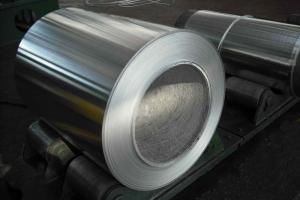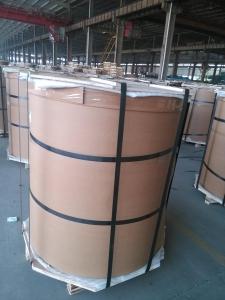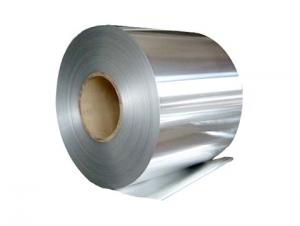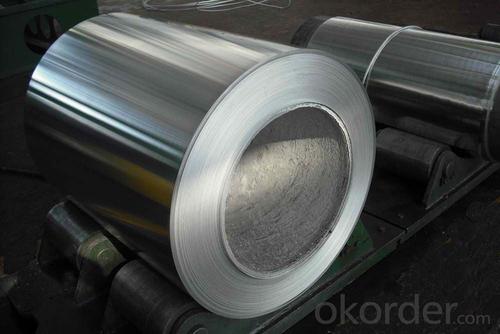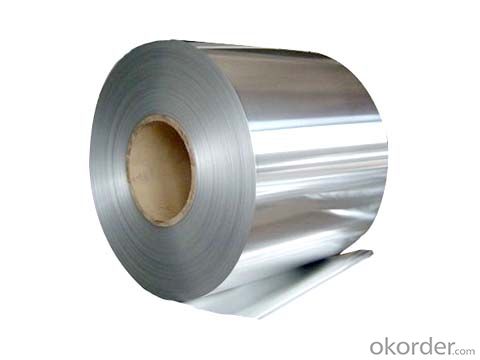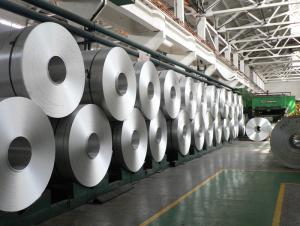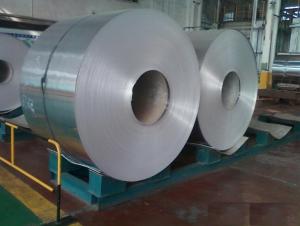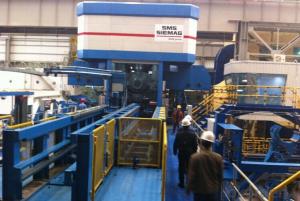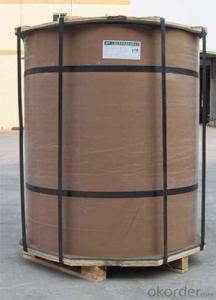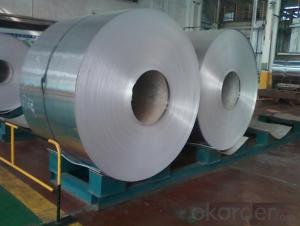Aluminum Sheet Metal Coil - Direct Casting Aluminium Foil Stock in Coil AA8019
- Loading Port:
- China Main Port
- Payment Terms:
- TT or LC
- Min Order Qty:
- -
- Supply Capability:
- -
OKorder Service Pledge
OKorder Financial Service
You Might Also Like
1.Structure of Product Description
Direct Continuous Aluminium Foil Stock in Coil is one semi-finished aluminium material. This strip can be rolled down to aluminium foil. It is widly used in the production of light guage foil, pharmaceutical foil, household foil,container foil ect.
2. Main features of the product
a.Competitive price---We have our own mills and can produce mill finished aluminium coils, so we can control the production cost better.
b.Professional after-sale service---We have more than 15 years exportation experience and you need not worry about the exporation problems.
c.Fast delivery time---We can control the delivery time within 35 days.
3.Image
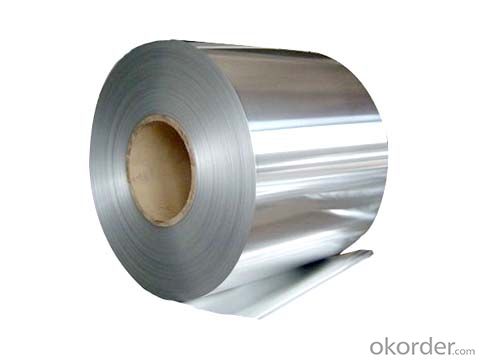
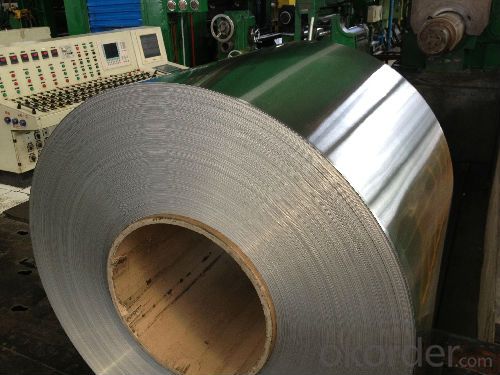
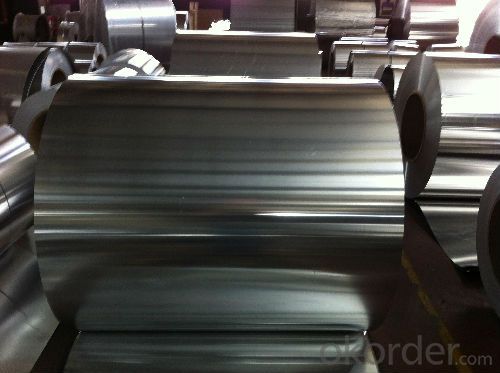
4.Products Specification
| Alloy | Temper | Surface | Profile | Coil ID |
| AA8079 | H14 | Free of defeats | -0/+1% | 405mm |
5. FAQ
What is the quality standard?
---Usually our standard is GB3880-2006
What is the largest width?
---It is 2300mm
What is the MOQ?
---Usually we can accept 80 tons.
- Q: Can aluminum coils be used for packaging applications?
- Indeed, packaging applications can make use of aluminum coils. Aluminum, being a versatile material, possesses various advantageous properties for packaging purposes. Its lightweight nature, resistance to corrosion, non-toxicity, and exceptional thermal conductivity are just a few of the many benefits it offers. These qualities render aluminum coils perfect for packaging applications such as food and beverage containers, pharmaceutical packaging, and cosmetic packaging. Moreover, aluminum can easily be molded into various shapes and sizes, allowing for tailor-made packaging solutions. Its durability ensures the safeguarding of the packaged goods, while its ability to be recycled makes it an environmentally conscious choice. In summary, the versatility, performance, and sustainability of aluminum coils make them extensively utilized in packaging applications.
- Q: Explain how aluminum coils function to shield against electromagnetic interference.
- <p>Aluminum coils protect against electromagnetic interference (EMI) through a process known as electromagnetic shielding. Aluminum, being a conductive material, can reflect and absorb EMI, preventing it from penetrating the protected area. When an aluminum coil is used as a shield, it creates an electric field that interacts with the EMI, either reflecting the interference back or absorbing it, thus reducing its impact on sensitive electronic equipment. The high conductivity of aluminum also allows it to distribute the EMI evenly across its surface, minimizing the effect of any single point of entry. This shielding is crucial in various applications, such as in electronic devices and communication systems, to ensure reliable performance and data integrity.</p>
- Q: What are the advantages of using aluminum coils?
- There are several advantages of using aluminum coils in various applications. Firstly, aluminum coils are lightweight compared to other materials such as copper or steel. This makes them easier to handle and transport, reducing the overall weight of the system or product they are used in. Additionally, their lightweight nature also makes installation and maintenance much simpler and more convenient. Secondly, aluminum coils have excellent corrosion resistance. They naturally form a protective oxide layer on their surface, which prevents further oxidation and corrosion, even in harsh environments. This makes them ideal for outdoor applications or in areas with high humidity or exposure to chemicals. Furthermore, aluminum coils have a high thermal conductivity, meaning they can efficiently transfer heat. This makes them particularly valuable in heating, ventilation, and air conditioning (HVAC) systems, where they can help improve energy efficiency and reduce the overall energy consumption. In addition, aluminum coils are highly flexible and can be easily formed into different shapes and sizes. This flexibility allows for greater design freedom and customization, making them suitable for a wide range of applications. They can be easily bent, cut, or shaped to fit specific requirements, without compromising their structural integrity. Lastly, aluminum coils are also cost-effective. Aluminum is abundant and widely available, making it more affordable compared to other materials. Moreover, its lightweight nature reduces transportation costs, and its corrosion resistance eliminates the need for frequent maintenance and replacements, ultimately resulting in long-term cost savings. Overall, the advantages of using aluminum coils include their lightweight nature, excellent corrosion resistance, high thermal conductivity, flexibility, and cost-effectiveness. These qualities make aluminum coils a popular choice in various industries, such as construction, automotive, aerospace, and HVAC.
- Q: Can aluminum coils be used in explosive environments?
- It is not recommended to use aluminum coils in explosive environments due to their flammable nature. When exposed to specific conditions, aluminum can easily ignite and worsen fires. Explosive environments, which already possess an increased risk of fire and explosions due to the presence of gases, vapors, or dust particles, should strictly avoid the use of aluminum coils. This precaution is necessary to eliminate potential ignition sources and maintain safety in the surroundings. Instead, materials with superior heat and fire resistance should be employed in these hazardous settings.
- Q: How do aluminum coils contribute to the sound insulation of buildings?
- The unique properties and applications of aluminum coils contribute significantly to the sound insulation of buildings. Being lightweight and flexible, aluminum can be easily shaped into coils, making it an excellent choice for sound insulation purposes. One way in which aluminum coils contribute to sound insulation is by serving as a barrier that prevents the transmission of sound waves. When installed in walls, ceilings, or floors, these coils create an additional layer that effectively blocks and absorbs sound energy. Due to its high density and rigidity, aluminum can reflect and absorb sound waves, thus reducing their intensity as they pass through the building structure. Moreover, aluminum coils can be combined with other soundproofing materials, like foam or fiberglass, to enhance their sound absorption capabilities. By working in conjunction with these materials, aluminum coils create a more comprehensive sound insulation system that traps and dampens sound waves. Another advantage of aluminum coils is their resistance to moisture and corrosion, which makes them suitable for both indoor and outdoor applications. This durability ensures that the sound insulation provided by aluminum coils remains effective over time, even in harsh environments. Additionally, aluminum coils are easy to install and maintain, making them a cost-effective solution for sound insulation in buildings. Their lightweight nature allows for effortless transportation and handling, while their flexibility enables them to be installed in various positions and configurations. To summarize, aluminum coils play a crucial role in sound insulation by acting as a barrier, reflecting and absorbing sound waves, and providing durability and versatility. Their combination with other soundproofing materials further enhances their effectiveness. With their lightweight and flexible properties, aluminum coils offer a practical and cost-effective solution for improving the acoustic performance of buildings.
- Q: How do aluminum coils contribute to sustainable manufacturing practices?
- Aluminum coils contribute to sustainable manufacturing practices by offering several advantages. Firstly, aluminum is a highly recyclable material, which means that using aluminum coils can help reduce the demand for raw materials and minimize waste. Additionally, the lightweight nature of aluminum coils reduces energy consumption during transportation and installation processes. Furthermore, aluminum has excellent corrosion resistance, which extends the lifespan of products made with aluminum coils, reducing the need for frequent replacements. Overall, aluminum coils promote sustainability by conserving resources, reducing energy consumption, and minimizing waste.
- Q: What is the purpose or use of aluminum coil in various applications?
- <p>Aluminum coil is a versatile material used in a wide range of applications due to its properties such as lightweight, corrosion resistance, and high thermal and electrical conductivity. It is commonly used in construction for roofing and siding, in the manufacturing of heat exchangers and radiators, and in electrical applications like transformers and power lines. Aluminum coil is also utilized in packaging, such as food and beverage cans, and in automotive and aerospace industries for lightweight components. Its malleability allows it to be easily shaped and formed, making it an ideal material for various industrial processes.</p>
- Q: Are aluminum coils compatible with other building materials?
- Generally, other building materials are compatible with aluminum coils. Aluminum, a versatile material, finds applications in various construction projects. It is frequently employed for roofing, cladding, gutters, and other external components of buildings. The lightweight property and corrosion resistance of aluminum enable its seamless integration with materials like wood, concrete, glass, and steel. Furthermore, aluminum coils can be effortlessly molded and shaped to meet specific design specifications, ensuring smooth compatibility with diverse building materials.
- Q: This question asks for criteria or methods to determine if a used aluminum coil is safe for reuse.
- <p>To determine if a used aluminum coil is safe to use, consider the following: Check for any visible signs of damage such as cracks, dents, or corrosion. Ensure the coil has been properly cleaned and sanitized to remove any residues or contaminants. Verify that the coil has not exceeded its recommended lifespan or usage limits. Consult the manufacturer's guidelines for any specific safety checks or maintenance requirements. If in doubt, it's best to consult with a professional or replace the coil to avoid potential safety hazards.</p>
- Q: What are the different types of aluminum coils available in the market?
- In the market, one can find various types of aluminum coils, each possessing its own distinct characteristics and applications. 1. Basic Aluminum Coils: These coils are simple and commonly used for general purposes. They have a smooth surface and find applications in industries like construction, automotive, and packaging. 2. Aluminum Coils with Enhanced Aesthetic Appeal: These coils are coated with paint or other finishes to improve their visual appeal and provide extra protection against corrosion. They are widely used in the manufacturing of building facades, signage, and decorative items. 3. Textured Aluminum Coils: These coils have a textured or patterned surface, which gives them a decorative appearance and makes them slip-resistant. They are often utilized in applications where both aesthetics and functionality are important, such as flooring, staircases, and decorative panels. 4. Anodized Aluminum Coils: Through the anodizing process, a protective oxide layer is formed on the surface of these coils. This enhances their resistance to corrosion and makes them suitable for outdoor applications, including architectural elements, electronic components, and the aerospace industry. 5. Pre-painted Aluminum Coils: These coils come with a pre-applied paint coating, eliminating the need for additional painting or finishing. They are frequently used in industries that require high-quality, durable, and consistently colored products, such as automotive, appliances, and electronics. 6. Aluminum Coils for Heat Transfer: Specifically designed for heat transfer purposes in air conditioning and refrigeration systems, these coils have high thermal conductivity. They are often made from alloy grades that offer excellent corrosion resistance in harsh environments. Considering the specific requirements and intended use of the aluminum coil is crucial before making a purchase. This ensures that the appropriate coil type is selected for the desired application, optimizing performance and longevity.
Send your message to us
Aluminum Sheet Metal Coil - Direct Casting Aluminium Foil Stock in Coil AA8019
- Loading Port:
- China Main Port
- Payment Terms:
- TT or LC
- Min Order Qty:
- -
- Supply Capability:
- -
OKorder Service Pledge
OKorder Financial Service
Similar products
Hot products
Hot Searches
Related keywords
